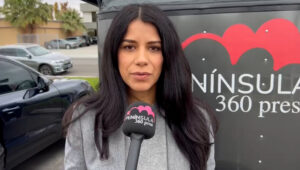
Community organizations in the Californian Central Valley have managed to set a precedent in terms of freedom of expression, after a demand in which the California Department of Justice (DOJ) ruled that Kern County violated the free speech rights of these women by denying them contracts for expressing their opinions.
And on December 7, California Attorney General Rob Bonta announced the DOJ resolution, which states that, after a two-part investigation, Kern County violated the free speech rights of a coalition of community organizations and a small business by refusing to enter into and sign contracts with them for engaging in free speech activities, specifically, for supporting defunding certain police agencies in connection with the Black Lives Matters movement.
Reyna Olaguez, executive director of South Kern Sol, an organization in the Central Valley, recalled during an interview with Manuel Ortiz during the Pen sula 360 Radio program, in collaboration with Marcos Gutierrez of "Hecho en California," that while the DOJ resolution is good, those who were really harmed by the lack of these contracts were the residents of Kern County themselves, especially the most vulnerable, among whom are farm and construction workers who do not speak English.
